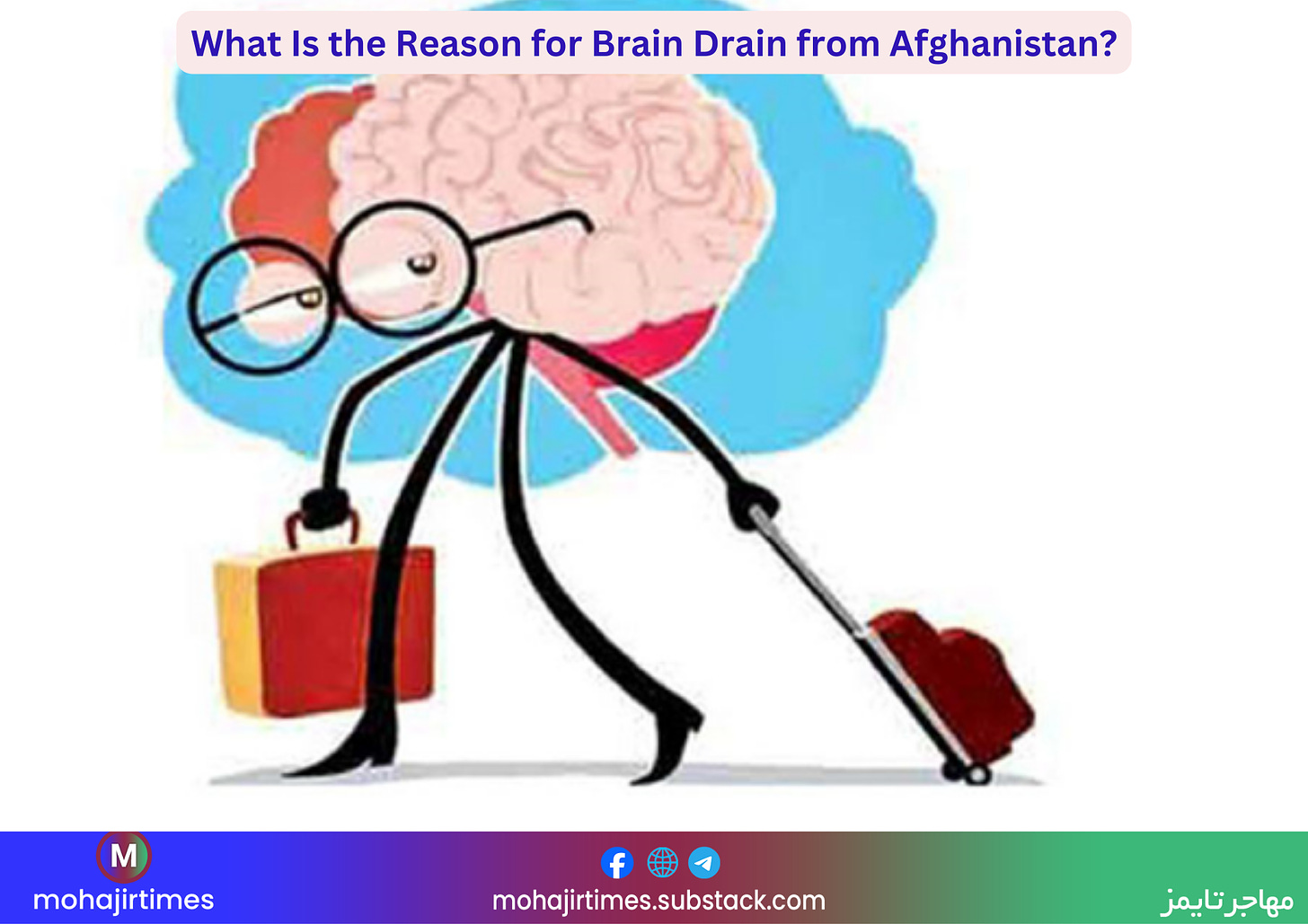The fall of the republic and the resurgence of the Taliban have brought upon darkness and misfortunes. These have affected social, economic, political, and gender-related issues, propelling people to flee. A considerable number of university professors, journalists, social and political activists, government officials, writers, artists, students, scholars, and critics have left the country. Although brain drain is not a new phenomenon, it has been a persistent issue in our society for fifty-sixty years ago. We have faced it intermittently, sometimes on a smaller scale and sometimes more significantly. Now, once again, it has become a pressing matter following the renewed dominance of the Taliban in Afghanistan.
The most recognized perspective that has delved into brain drain is the economic viewpoint. From this standpoint, the relationship between technology, skilled human resources, and economic development is examined in the context of brain drain. The central focus of this perspective is the economic reasons for brain drain from underdeveloped or developing countries to developed ones, with a positive and negative evaluation of this phenomenon. However, we do not view brain drain from this perspective. Although Afghanistan is undoubtedly a backward country in terms of economic development and technological indicators, and brain drain may have both positive and negative consequences, our attention is directed towards the social-political phenomenon of brain drain. In other words, we look at this phenomenon from a social-political perspective.
So, it is clear that by “Brains” we are referring specifically to intellectuals, writers, university professors, dissidents, social and political activists. In other words, if we consider the phenomenon of brain drain as a general occurrence, our intent is focused on these mentioned segments of society. Why? Because these segments have the potential to be problematic for the social order and political governance. They can challenge the existing politics at any moment. Experts, technicians, managers, and economic technologists do not find a place in our analysis. Why? Because they might be apolitical, not have objections to the current social-political situation, and may not challenge politics and society. Consequently, and for this reason, they are less targets of repression and oppressive policies.
A social-political perspective on the phenomenon of brain drain necessitates a sociopolitical and phenomenology. This means considering the migration of brains as a social-political phenomenon. In this approach, social and political actors, intellectuals, and ideological forces become the focal point of attention, taking the path of migration due to societal and political reasons. These reasons are not primarily economic or less economically driven. The fundamental causes stem from society and politics. Therefore, it is necessary to define both the source and destination societies. Who is fleeing from what kind of society, and to what kind of society are they heading? The desired condition is that of backwardness. However, sociopolitical backwardness does not discriminate between ideological societies with ideological-political oppressive governments, whether inspired by heavenly or earthly ideologies.
A free democratic individual cannot coexist with Stalinist totalitarianism to the same extent they cannot coexist with the Taliban. On a global scale, the historical phenomenology of brain drain also does not demonstrate that a democratic individual has fled from West Germany to Stalinist-controlled Soviet Union or sought refuge from the United States in Nazi Germany. Conversely, brains have migrated from non-democratic societies to democratic ones. The sociopolitical origin of brain drain lies in societies that are economically underdeveloped or in the process of development and, socially-politically, in ideological societies with autocratic governments.
Afghanistan has never been democratic, both socially and politically. Socially, we have faced the dominance of religious authority, and this remains the case. Politically, we have experienced a religious-political government, and currently, we are under one. Please do not assert that the Islamic Republic of Afghanistan was democratic. A democratic government necessitates having a democratic society, which Afghanistan lacks in both aspects. The so-called Islamic Republic, touted as democratic, in its latest analysis, was a fusion of secular Pashtun nationalism, political Islam, and a minimal degree of democratic semblance. Now, the ideological-political dominance of the Taliban is making redder the blood of our society and people.
If we trace the historical-social-political phenomenology of brain drain from fifty years ago, the process of brain drain increased after the coup of April 27,1978. Those who could not reconcile with the leftist government chose the path of escape. Brain drain was not a significant and serious phenomenon before the 1978 coup. During the absolute rule of the Zahir Shah, was not prevalent in our society as it is today. Although it was applied extensively, fewer elites and socio-political activists opted for escape. However, the Shah's prisons were filled with elites, socio-political activists, poets, and writers. During the fake Republic of Daood Khan, the brain drain process increased. But it was not very wide. This time, the place of elites and intellectuals was again in prisons.
With the coup of April 27,1978, the trend of brain drain in social, political, and religious aspects increased compared to the past. Individuals with liberal, Islamic political (Ikhwanism), and Maoist leftist tendencies chose to leave the country. Therefore, Islamists mostly went to neighboring countries such as Pakistan, Iran, and a few to Western lands. However, they harbored the desire to return and reappeared on the fronts of jihad. With the victory of the Mujahideen, the situation reversed. This time, intellectuals and leftist elites were mostly leaving the country for Western destinations. The political wheel brought the jihadists from the pinnacle of power to the bottom, and the Taliban emerged with their emirate sign. Both left and right, jihadists, socialists, and democrats were compelled to flee.
September 11, 2001, was a turning point that led many jihadists, leftists, and liberals to return to the country. From then until the fall of the fake republic, brain drain was not acute. Although it did not disappear, just as some returned to their homeland, some also left. Now the Taliban have once again made the brains escape. As far as it is inferred from the current state of our society under the rule of the Taliban; [Suffocation, discrimination, suppression of social, political, religious, and gender freedoms, lack of job opportunities, rabid and predatory racial, linguistic, religious and gender chauvinism of the Taliban is the cause of the brain drain in Afghanistan today].
Why the brain drain is somewhat clear. But the question is, what are the social and political consequences of brain drain for our society? Currently, the field of society and politics is empty for the Taliban flounce. They are now hurling as the horseshoes, extorting and looting. Oppositions and anti-Taliban political forces are based outside the country. The military movements that were initially formed against the Taliban were suppressed. Now there is no strong and significant military movement in the country. There is no serious political opposition in the country. Civil flows inside the country, if there is a flow, have no breath. Small groups of protesting women and girls in the cities take the fatal blows of collapse. As far as they can, one by one they take the way out of the country and escape.
The brains that have escaped now or are trying to escape are considered the conscious and vanguard forces of changing the social and political order. They have left the bed of transformation. Therefore, regardless of whether they are democratic or non-democratic, they will delay the possibility of change and transformation to a distant future. You might object that this is elitist thinking. But without being elitist, this is the reality of our society. The masses of the society will not be able to move forward without elites and educated people. Why? Because illiteracy combined with superstitions and pettiness, the lack or low level of political consciousness still keeps the majority of the masses of our society entangled like poisoned spider webs.
In this sense, coherence and direction, formation and organization of the socio-political struggle is a task that the elites will be able to handle. The ability and consciousness of organization and organized struggles in the masses is very weak and they will not be able to open a path towards change. On the other hand, the elites will play a key role in determining the nature and direction of socio-political change and transformation. The role that the masses may not be able to play well is to be the force of change and transformation and support the elites. But now we are sadly and painfully facing the vacant place of elites in society.
*Rafiq Ibrahim is the pseudonym of a freelance writer and social activist.





